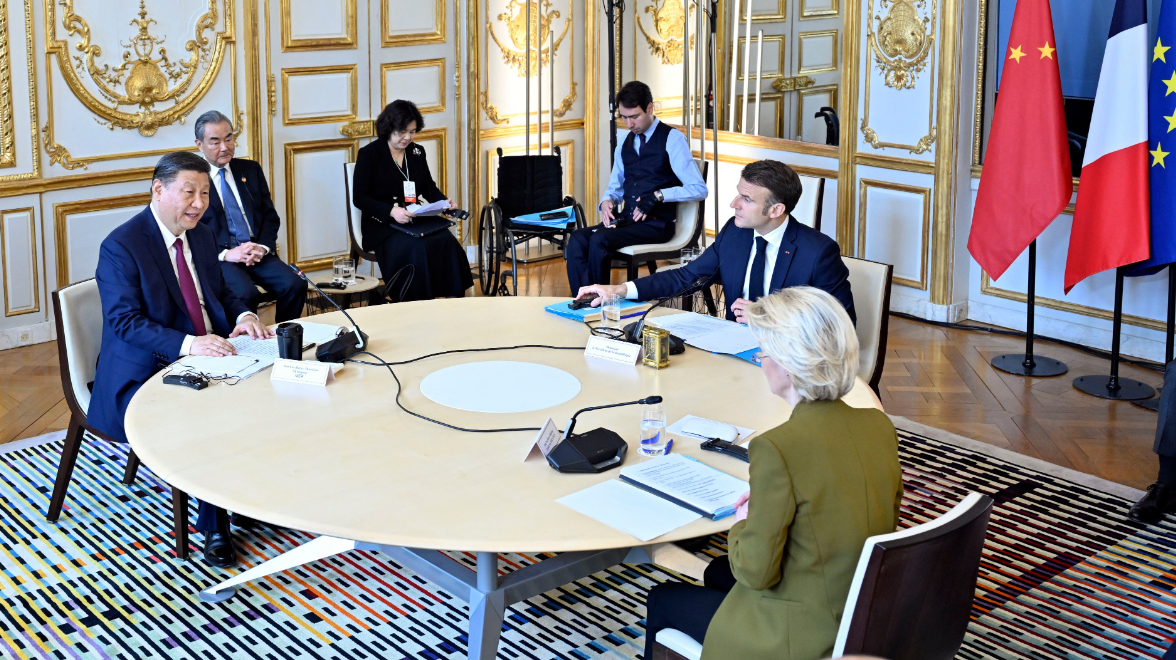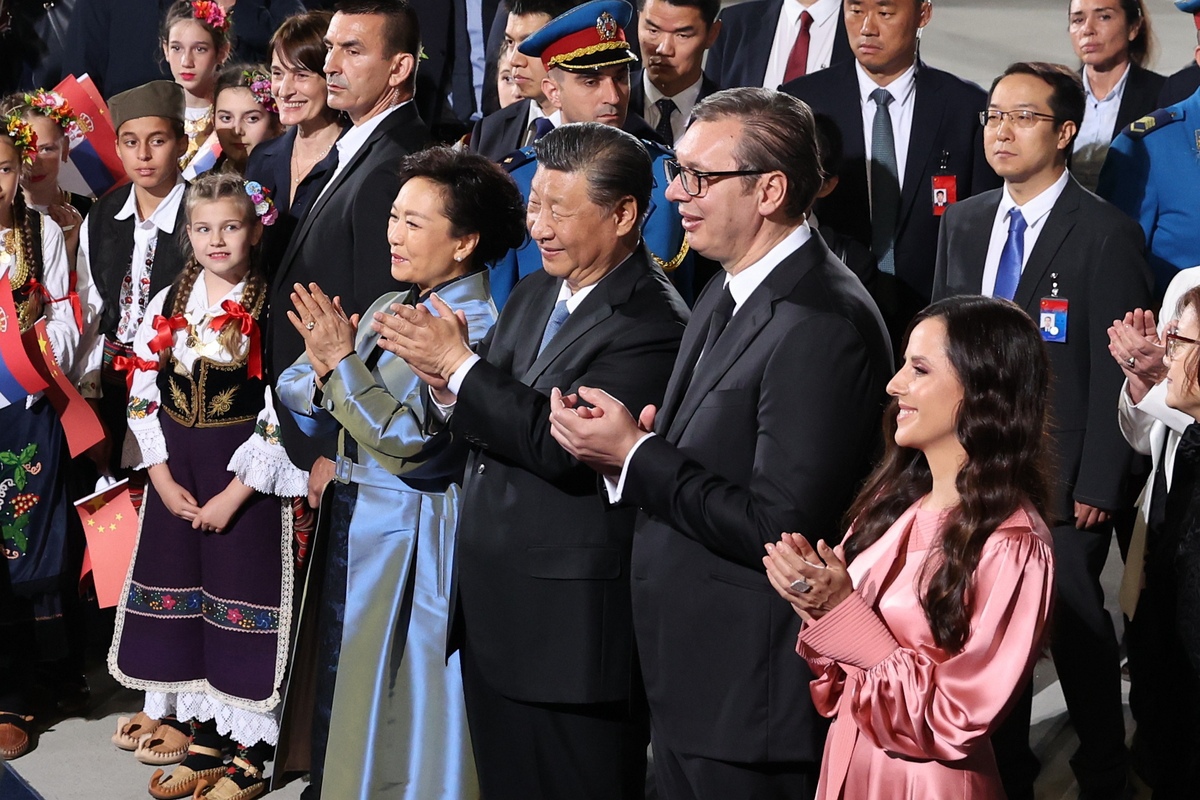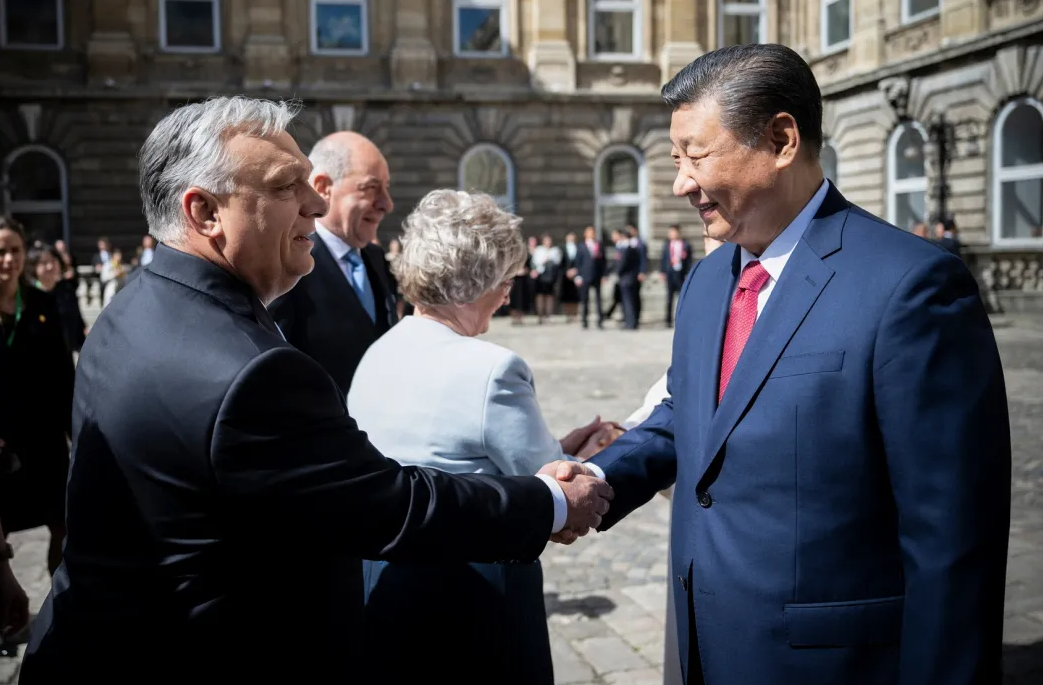
Chinese President Xi Jinping (1st L), French President Emmanuel Macron (2nd R) and European Commission President Ursula von der Leyen (R) hold a trilateral meeting at the Elysee Palace in Paris, France, May 6, 2024. (Photo: X account of Hua Chunying)
The strategic significance of President Xi Jinping’s trip to Europe — undertaken at a time when the international situation is at a crossroads and China-Europe relations are facing a critical moment — goes far beyond bilateral ties. China and Europe are two major forces, both as markets and civilizations, and their strategic postures and choices may determine whether the world is headed toward confrontation or cooperation, as well as whether countries continue to engage in mutually beneficial win-win cooperation or decouple.
Strategic consensus in new era
President Xi’s visits to three countries demonstrated the “unity in diversity” aspect of China’s policy toward Europe. France, Serbia and Hungary — all with long-standing friendly relations with China, and each with peculiar characteristics in Europe — are examples of different forms of cooperation.
France was the first Western country to establish diplomatic ties with China, and 60 years of subsequent diplomatic relations have borne witness to, and showcased, a spirit of independence, mutual understanding, strategic foresight and mutually beneficial win-win cooperation.
Serbia is China’s first all-around strategic partner in Central and Eastern Europe, and the bilateral friendship has stood the test of time.
Hungary was among the first countries to establish diplomatic relations with China, and the healthy development of ties has set an example for a new type of international relationship.

Chinese President Xi Jinping and his wife, Peng Liyuan, are welcomed on May 7, 2024 by Serbian President Aleksandar Vucic (front, second from right) and his wife, Tamara Vucic (front, right), upon their arrival at Nikola Tesla Airport in Belgrade, capital of Serbia. (Photo: WANG Zhuangfei / CHINA DAILY)

Chinese President Xi Jinping (right) shakes hands with Hungarian Prime Minister Viktor Orban (left) prior to a welcoming ceremony in Buda Castle of Budapest, Hungary on May 9, 2024. (Photo: Vivien Cher Benko/Pool/AFP.)
All parties coalescing
Xi said that China has always looked at relations with Europe from a long-term strategic prospective, and it takes Europe as an important dimension of major-country diplomacy with Chinese characteristics and an important partner in realizing Chinese-style modernization.
European Commission President Ursula von der Leyen also pointed out that China plays a significant role in global affairs, and keeping fine relations with China is of critical importance for Europe.
China and France agreed to carry forward the sprit of their diplomatic relationship and add new connotations. China and Serbia declared they would deepen and upgrade their all-around strategic partnership and build a China-Serbia community with a shared future for a new era. China and Hungary also announced they would build an all-weather, all-around strategic partnership for the new era.
Responding to international hot spots
During the visits, China and Europe had fruitful exchanges on regional and international hot spot issues of common concern. China and France released four joint communiques on the Middle East situation, artificial intelligence and global governance, biological diversity and the oceans and agricultural exchanges and cooperation. Both sides agreed to deepen collaboration in such areas as climate change and biodiversity. And they jointly called for a global truce during the Paris Olympics.
With regard to the Ukraine crisis, China, France and Europe all wish the war would come to an end as soon as possible. Europe supports a political solution to the Ukraine crisis. China and Europe also have many points of agreement on the Palestine-Israel issue. China is willing to work with the European side to support holding a larger-scale and more authoritative international peace meeting with more pragmatic outcomes as soon as possible, and to work out a specific timetable and road map for implementing a two-state solution.
Adhering to win-win cooperation
China-Europe economic and trade cooperation has been troubled by politicization and the abusive exaggeration of security concerns. Still, bilateral economic and trade ties have shown resilience. The two sides signed a series of cooperation agreements during Xi’s visits, sending a clear message of pragmatic cooperation.
Consolidating foundations
China and France signed interdepartmental cooperation agreements on aviation, agriculture, green development and the collaboration of small and medium-size companies. China and Serbia signed 28 documents on bilateral cooperation in such areas as the Belt and Road Initiative and green, digital and infrastructure development. The first-stage measures of Chinese support for the bilateral community with a shared future, including the bilateral free trade agreement, will take effect on July 1. China and Hungary signed or reached 18 agreements on bilateral cooperation, covering the BRI, economy and trade, investment, science, technology, culture and agriculture. Pragmatic cooperation with the three countries has thus been deepened.
People-to-people exchanges
China will support France as host of the Paris Olympics. It will also accommodate more than 10,000 French students to study in China over the next three years and double the number of European youths coming to China on exchange trips. It will extend to the end of 2025 the visa waiver policy for citizens of 11 European nations making short visits.
China will also support visits to China of 50 young Serbian scientists for professional exchanges and invite 300 Serbian students to study in China. China and Hungary will continue supporting language instruction in each other's country, make good use of the platform of cultural centers and further improve their respective exit and entry policies.
Guiding correct perceptions
China-Europe relations have generally developed well in recent years, but some new issues and challenges have also emerged. Since 2019, in particular, the EU has positioned China not only as a cooperation partner but also as a competitor and systemic rival, adding complexity and uncertainty to bilateral ties. Xi emphasized the relationship’s built-in dynamism, directly addressed differences and actively guided and built correct perceptions of China.
By emphasizing the “strong economic symbiosis” between the Chinese and French economies, Xi made clear that the relationship “is not targeted at, subjugated to or controlled by a third party.” He highlighted the dynamism of China-Europe ties, and said that the two sides should adhere to their partnership, dialogue and cooperation. They should carry out strategic cooperation, promote the steady and healthy development of bilateral relations and continue contributing to world peace and progress, he said.
All three countries responded positively to Xi’s appeals, which highlighted the importance of cooperation and the significance of developing ties for domestic, regional and global peace and prosperity.
Responding to such claims as Chinese “overcapacity,” Xi said that China’s green production capacity is advantageous capacity resulting from market mechanisms. China and Europe share extensive common interests and there is plenty of room for cooperation in the green and digital transformation, he added.
The host of cooperation agreements reached with the three countries concerning green production capacity were a powerful reply to the pseudo-assumption of “overcapacity,” and the “upward balance” Xi proposed showed the way forward for China-EU green cooperation.
As China and the EU prepare to celebrate their 50th anniversary of diplomacy, China-Europe relations are at a critical moment. President Xi’s visits will not only further enhance the strong symbiosis between the parties but will add precious momentum to the healthy development of East-West relations and to world peace and stability.